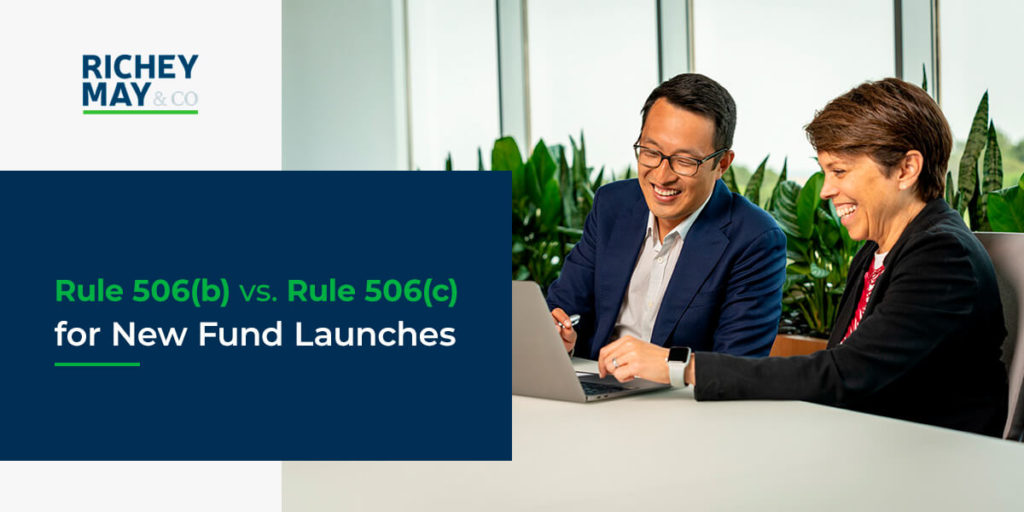Alternative Investment
Rule 506(b) vs. Rule 506(c) for New Fund Launches
Articles by: Richey May, Mar 15, 2022

For emerging managers and founders of startups, raising funds can be a time-consuming process. As founders have numerous options for raising capital, they should understand the offerings of both Rule 506(b) fundraising and 506(c) fundraising and the effective means of opting for one or the other without the burden of registering securities with the Securities and Exchange Commission (SEC).
Since many new fund launches seeking capital are unable to register securities with the SEC, these new organizations tend to depend on an exemption to the requirement for registration.
In This Article
- What Is Regulation D?
- What Is Rule 506(b)?
- What Is Rule 506(c)?
- Do You Have Questions on How to Start Raising Capital?

What Is Regulation D?
Regulation D, also known as Reg D, provides a list of exemptions to the Securities Act’s registration requirements that new companies frequently rely on for issuing securities to investors. Included in Regulation D are two exceptions to the general requirement securities registration, known as 506(b) and 506(c). Syndicators can raise money from investors without needing to register the securities with the SEC if they meet the following Reg D requirements:
- File a notice with the corresponding state after the security is sold.
- File a notice on Form D to the SEC by the deadline, which requires basic information about the issuer and the offering.
To be eligible for this exemption, also known as the private placement exemption, buyers of the securities should:
- Possess enough knowledge and experience in business and financial matters to be considered sophisticated investors or be able to handle the investment’s economic risk.
- Agree to not distribute or resell the securities to the public.
- Have access to the information typically included in a prospectus for an offering of registered securities.
Generally, publicly advertising the offering and soliciting investors is not compatible with the private placement exemption. Even if a company can be exempt from registration, a company should provide sufficient information to investors to prevent a violation of antifraud provisions, meaning that the information a company gives investors should be free from misleading or false statements. A company should not exclude information if omitting it would make what information is given to investors misleading or false.
The most noteworthy party of Regulation D is the inclusion of Rule 506, which provides an alternative to methods of selling securities that have more stringent requirements and are cost-prohibitive for many companies.
What Is Rule 506(b)?
Rule 506(b) of Reg D allows a startup to accept an unlimited amount of money through investments from as many accredited investors as desired. Up to 35 may be nonaccredited investors. Under this offering, startups will not need to go through the process to verify an accredited investor status for each investor, thus removing a lengthy procedure from fundraising processes.
If companies sell securities, they cannot use any means of general solicitation or advertising to promote their offering. As such, a company needs to demonstrate that it had a substantial prior relationship with an investor before making any investment offerings. Under the 506(b) exception, companies that sell securities should follow general guidelines that include:
- Need to provide disclosure documents to non-accredited investors, such as an audit of the balance sheet
- Must have a substantive, pre-existing relationship with potential investors
- Can depend on investor self-certification
Part of Regulation D
Under Regulation D, Rule 506(b) is considered a safe harbor. Regulation D provides objective standards that companies can use to meet the requirements listed under the Section 4(a)(2) exemption. If non-accredited investors participate in the offering, the company that is conducting the offering should:
- Be available for answering questions from prospective buyers who are non-accredited investors
- Give financial statement information to non-accredited investors as specified in Rule 506
- Provide disclosure documents to non-accredited investors
Pros and Cons
There are many pros to Rule 506(b):
- 506(b) is more affordable than alternative methods, as there are no specific requirements on private placement memorandums or disclosures.
- Disclosures do not need to be provided to accredited investors.
- Though disclosures must be provided to non-accredited investors, these disclosures are more relaxed than other types of offerings.
- The only filing requirement is filing Form D with the SEC.
- No ongoing reporting is required.
Of course, there are some cons to Rule 506(b), as well. The issuer needs to make sure the investor is a sophisticated investor, meaning they have knowledge of business or investments and are familiar with this type of investment. General solicitation is also not allowed.
What Is Rule 506(c)?
Rule 506(c) allows startups conducting an offering to engage in general solicitation and advertising. However, unlike Rule 506(b), startups must take reasonable steps to verify that all investors are accredited investors only. The lengthy procedure of this includes reviewing brokerage statements, tax documents, credit reports and other financial documents to verify the investors’ status before accepting a potential investment. Self-certification is not permissible for Rule 506(c).
The biggest difference between Rule 506(c) and Rule 506(b) is that companies cannot usually solicit or advertise with 506(b), but they can generally solicit or advertise with 506(c).
JOBS Act 2013
The Jumpstart Our Business Startups Act (JOBS Act) led to Rule 506(c), an extension of Regulation D’s Rule 506. Rule 506(c) provides more opportunities for real estate investors and businesses to raise capital and stimulate the economy. This also led to the development of today’s real estate equity crowdfunding.
Pros and Cons
As with Rule 506(b), there are many pros to Rule 506(c):
- There is no ban on general solicitation, so businesses that are looking for investors can advertise the investment opportunity to the public.
- The issuer can raise an unlimited amount of money from unlimited investors.
- There are no disclosure requirements.
Of course, there are also some cons to Rule 506(c). Non-accredited investors cannot participate in Rule 506(c), so all investors must be accredited. 506(c) also has an additional required step — verifying accredited investor status. The issuer may need to file with the states in which they sell securities, as well.

Do You Have Questions on How to Start Raising Capital?
For a new fund launch, understanding 506(c) vs. 506(b) is essential. To decide between Rule 506(b) and Rule 506(c), determine whether you have investors in your network who would be interested in your deal. If you have investors in your network, Rule 506(b) may be best for you, as this rule does not allow for general solicitation. On the other hand, if you know you will need to solicit investors, Rule 506(c) is your only option under Regulation D.
Since Richey May & Co. was founded in 1985, we have been providing technology solutions and tax, assurance and business advisory services to clients throughout the United States. Our firm specializes in mortgage banking and alternative investment and financial services, and we offer a wide array of customized solutions to meet the needs of your company.
If you have any other questions on how to approach raising capital and the mentioned rules for startups, contact us at Richey May for more information.


